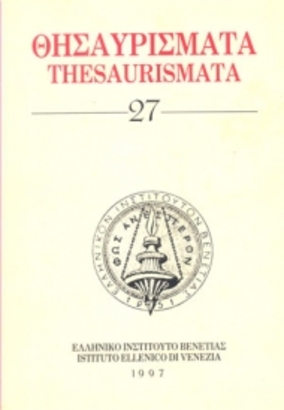Ο δημόσιος πλειστηριασμός των φόρων του 1578 στον Χάνδακα της Κρήτης. Η αποχή των φοροενοικιαστών
Part of : Θησαυρίσματα ; Vol.28, 1998, pages 175-195
Issue:
Pages:
175-195
Author:
Abstract:
The public auction held every year (in February) for the hiring out of taxes was an institution on which the Venetian authorities heavily depended in order to balance the immense expenses of the Regno di Candia. In 1578 the public auction proved fruitless because the tax farmers abstained. After numerous futile holdings the island’s provveditore generale, Luca Michiel, had five of the main and usual tax farmers called to the cancellarla maggiore where he questioned them on the reasons of their abstention. To him the indifference for the 1578 taxes was a clear sign of conspiracy against the well being of the state, triggered by the tax farmers’ inordinate personal interests. On the other hand the tax farmers, in order to justify their attitude, adduced a series of reasons which according to them caused poor results in tax collecting, thus bringing them to the point of bankruptcy. But that was not all. The main obstacle, as they declared, was the prohibition set
to public debtors to participate in tax farming. That was the nucleus of the confrontation. The tax farmers proved quite solid and decisive in their cause, so Luca Michiel gave in. He raised the ban on public debtors. Had Michiel an alternative or not? Were the tax farmers capable of imposing a long-lasting abstention and preventing others, non tax farmers, to take advantage of it?These basic questions can be dealt with if only studied in accordance to the social and economic conditions prevailing in Crete. This study gives evidence of a situation in which tax farmers enjoyed a kind of immunity, giving them the necessary space to act on will, especially when reimbur sing the instalments of tax collection.It also discloses the fact that the 1578 incident was the climax of a crisis menacing public finance long before and after. Last, but not least, the act of abstention transformed the tax farmers’ body into an informal but actual pressure group, which acted up to secure its econo
mic privileges.
Subject (LC):
Notes:
Περιέχει σημειώσεις




